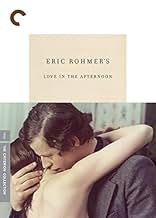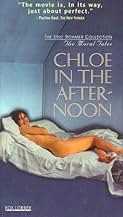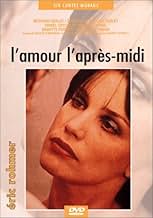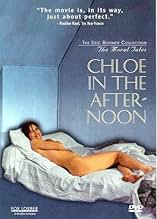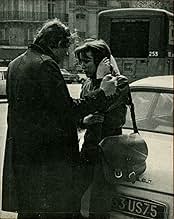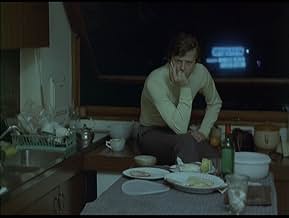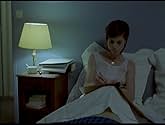हालाँकि उसकी एक बहुत ही प्यार करने वाली पत्नी है, फिर भी एक रुढ़िवादी पुरुष दूसरी महिलाओं को पाने के लिए आकर्षित है.हालाँकि उसकी एक बहुत ही प्यार करने वाली पत्नी है, फिर भी एक रुढ़िवादी पुरुष दूसरी महिलाओं को पाने के लिए आकर्षित है.हालाँकि उसकी एक बहुत ही प्यार करने वाली पत्नी है, फिर भी एक रुढ़िवादी पुरुष दूसरी महिलाओं को पाने के लिए आकर्षित है.
- पुरस्कार
- कुल 1 जीत
- Martine
- (as Babette Ferrier)
फ़ीचर्ड समीक्षाएं
I was particularly taken with the scene on the train when Frederic begins to explain how he is able to remain under control in the presence of so many beautiful women in the world. Simply acknowledging such beautiful creatures seems to be enough for this man, yet when Chloe arrives on the scene we begin to wonder if Frederic will fold under pressure.
I can surely identify with what Frederic feels on the train. It happens to all of us -- we are faced with beauty, and we must respond. How we respond is what makes life worth living.
Where he fails is in not being able to create three-dimensional characters, or not being able to coax a good performance from an actor. The glaring example of this is Brialy in Le genou de Claire who, wearing a thick beard, seems to sleep-walk through his part: his erotic obsession with a girl's lissome kneecap never comes to life. In the film in question today, Bernard Verley has a bland, pudding-like face that hardly provokes any interest in the viewer. How can such a pallid bourgeois be appealing to a bohemian girl like her?
Francoise Verley as the wife has all the best moments; certainly the final scene is more interesting than what went before. She is not a beautiful woman, but her quiet strength and natural acting style are very convincing. Zouzou does not have the underlying restless energy and fierce sexuality you would expect in a girl who drifts from man to man, and her acting skills are minimal. All in all, a good film when concentrating on the family dynamics, but those scenes at the office between Verley and Zouzou are often tiresome.
Like other movies from Rohmer, "L'Amour l'après-midi" is presented like a book. It's a great combination of cinematic and literary experience.
Out of 100, I give it 84. That's good for *** out of ****.
Seen at home, in Toronto, on November 18th, 2002.
All of the "Six Moral Tales" provide the viewer with a cast of excellent and memorable characters. Even if these characters aren't always the most likable (just look at the film "La collectionneuse"), they are always very interesting to watch. I believe that the characters in "Chloe in the Afternoon" may be the greatest characters in the "Six Moral Tales" series. Especially the character of Chloe, a very smart and likable character who offers a lot of the film's greatest and most interesting dialogue (great dialogue is another feature that is all over this film series).
Another thing that I found highly impressive about the way her character was written was how she is given a clear back story, but, instead of her back story being forcefully told to the audience in detail all at once it is simply glanced over. It is perhaps the least forced back story given to a character in any other film that I've seen.
The film also turns out to be the most emotional of the "Six Moral Tales", with a truly compelling ending sequence. You can tell that director Eric Rohmer's films really began to mature since the earliest of the "Moral Tales", the 1962 short film "The Bakery Girl of Monceau".
While it isn't the best of the "Six Moral Tales", and it was kind of slow at times, it is a perfectly fitting ending to one of the greatest of all film series!
क्या आपको पता है
- ट्रिवियाThis film is part of the Criterion Collection, spine #348.
- गूफ़At approximately 1:16 in the film, Chloe opens the store door wearing red shoes matching her dress. In the following scene, she walks down a staircase wearing black shoes which match her stockings.
- भाव
Frédéric: [voice over] That's why I love the city. People come into view, then vanish. You don't see them grow old. What makes the streets of Paris so fascinating is the constant yet fleeting presence of women whom I'm almost certain never to see again. It's enough that they're there, indifferent, conscious of their charm, happy to test its affect on me, as I test mine on them, by tacit agreement, without even the subtlest smile or glance. I feel their seductive power without giving in to it. This doesn't estrange me from Hélène. Far from it. I tell myself these passing beauties are simply an extension of my wife's beauty. They enrich her beauty and receive some of hers in return. She's the guarantee of the world's beauty and vice versa. When I embrace Hélène, I embrace all women.
- कनेक्शनFollows La boulangère de Monceau (1963)
टॉप पसंद
विवरण
बॉक्स ऑफ़िस
- दुनिया भर में सकल
- $3,520
- चलने की अवधि1 घंटा 37 मिनट
- ध्वनि मिश्रण
- पक्ष अनुपात
- 1.37 : 1
इस पेज में योगदान दें


![Bande-annonce [OV] देखें](https://m.media-amazon.com/images/M/MV5BNDVkYjA1MTItYWFjMi00ZTQ3LTg2NGQtZmZhOTg4MjU1MTg4XkEyXkFqcGdeQXRyYW5zY29kZS13b3JrZmxvdw@@._V1_QL75_UY281_CR5)
